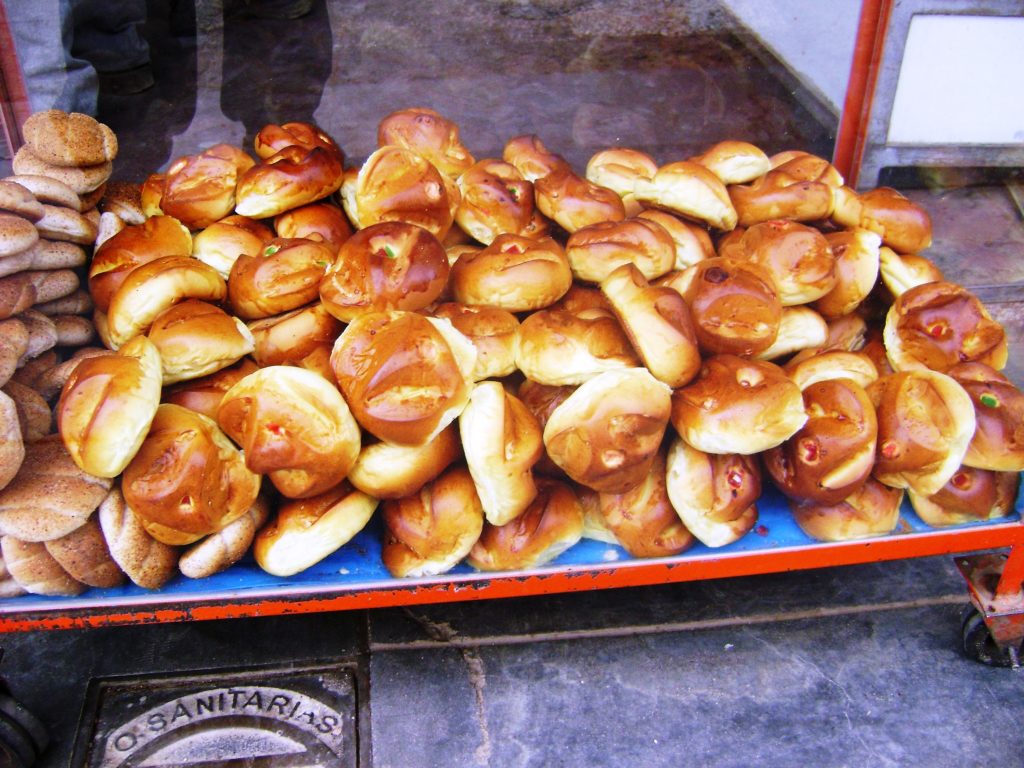It’s not unusual to talk about food at our family reunions. It’s not unusual to complain about the ingredients we need and cannot get here, in order to prepare that recipe we are craving. To fulfill this craving is to honor who we are and where we came from. To make a good ceviche, we say, we need tiger shrimp. Arroz con leche must have real cinnamon sticks, coconut for a delicious flan, ciruelas for bread pudding, sapote for sapote syrup.
We eat until our mouths become lazy from all the chewing, and when we talk we always head back to childhood. Bread—in all of its varieties and occasions—is always mentioned. There is nothing better than the early evening snack we walked to buy at the baker’s.
He owned a store on the main boulevard, with a nice window and a rattan basket on the counter full of old bread, baked in the morning, that people could take for free. The evening bread meant our homework was already done, meant picking up our friends on the way there. It meant crossing that busy boulevard and my mother’s voice caught between the door’s screech and the serene—look both ways! It meant the 6:30 wind would come, offering relief and the scent of peace, and fresh evening bread you could smell a block away.
Sometimes we arrived just as La Panadería was opening for the afternoon shift and got to see the iron front as it went up and let out the smell of rising yeast. They called the round, brown bread with yellow squares on top cara sucias.
Our job was to bring back two bags full of different kinds of breads: cachitos, what we call croissants, and palanquetas, our version of Italian bread, for sandwiches. Every Friday we walked to my mother’s cousin’s house, where the adults gathered to play poker. We took all of the bread we purchased that afternoon, and my parents brought along a bottle of Rum San Miguel.
All of us kids loved their place. It was a tall house with an open terrace off which long verbena leaves hung. When we approached the house before sundown, their yellow centers appeared to us as feeding bees. After midnight, light bulbs. The house had three floors and a black, iron spiral staircase that served as a spinal cord uniting the three floors.
While the adults played, we were in the next room with our second cousins. We often drank so much Coca-Cola our voices were louder than the game. There were eight of us in total and us younger ones played as if we were in a distant field, though our voices gave us away during hide-and-seek.
At midnight came the snacks, three slices of mortadella, two slices of cheese, on sandwiches with lettuce and tomatoes held by buttery toasted bread. Light bouncing back from our faces as we sat in circle. As we walked home, in the dark, my mother’s tipsy laugh was a cascade. Anything made her giggle or laugh. I could hear her heels as we took shortcuts through cobblestone streets. The elegance of their parental step, as they held hands and walked ahead of us. My father was her best friend, always laughing with her. Their stride started and stopped in sync; their outlines our point of reference.
We couldn’t have imagined that just a few years later we would be separated from our parents, that they would come to New York for some scrappy survival and we would stay behind. They were so far from the cobblestone streets on the way to my cousins, far from our two-story house near the baker—who for years sent his regards to my absent parents, as did the butcher, and the neighbors who put their own letters inside of the ones we sent to them.
Our first week in New York, we took great joy in food shopping. We had shifts for pushing the shopping cart as we rode the aisles. Our eyes took inventory of everything we would like to taste. All five of us followed our parents past the shiny cellophane-wrapped candy. We wanted big bags of anything. We had not walked as a pack for many years.
Standing by the fruit section, under the lights, someone asked my sister if the mango in her hand
was ripe. This was not the same mango we ate at home. This mango was bigger and greener, ours was yellow and small. To eat it you peeled it with your hands, took it to your mouth, let the juices run their way to your forearm. My sister couldn’t say so she shrugged her shoulders. Soon, we learned to pick from the pile, looking for signs of maturity. A red shadow appearing at the bottom, an intense yellow on one side, and finally, squeeze hard with one hand.

Silvia Bonilla holds an MFA in poetry from the New School. Her work has been featured in/is forthcoming from Pittsburgh Journal, Green Mountains Review, Rhino, Reed Magazine, Cream City Review, and Pen&Brush, among others. She has received scholarships from the Vermont College of Fine Arts, Colgate Writers Conference, and The Frost Place. She recently received a Fellowship from The Saltonstall Foundation for the Arts. You can find her at: https://www.bonillasilvia.com/about.html


Comments are closed.